Ethical Dilemmas in Organ Transplant: Pros and Cons Analysis
VerifiedAdded on 2021/06/15
|11
|3909
|34
Essay
AI Summary
This essay provides a comprehensive overview of the ethical dilemmas associated with organ transplantation. It explores the advantages and disadvantages of organ donation and transplantation, examining the complexities surrounding donor consent, recipient rights, and the role of healthcare professionals. The essay delves into various ethical challenges, including the allocation of scarce resources, the impact of donor health status, and the potential for exploitation. It also discusses specific issues such as xenotransplantation, living donor transplantation, and the ethical considerations related to bone marrow transplantation. The essay highlights the need for clear ethical guidelines and practices to ensure fairness, transparency, and respect for the rights and well-being of all stakeholders involved in the organ transplantation process. It also emphasizes the importance of addressing the shortage of donor organs and promoting public awareness to improve the overall efficiency and ethical integrity of organ transplantation programs.
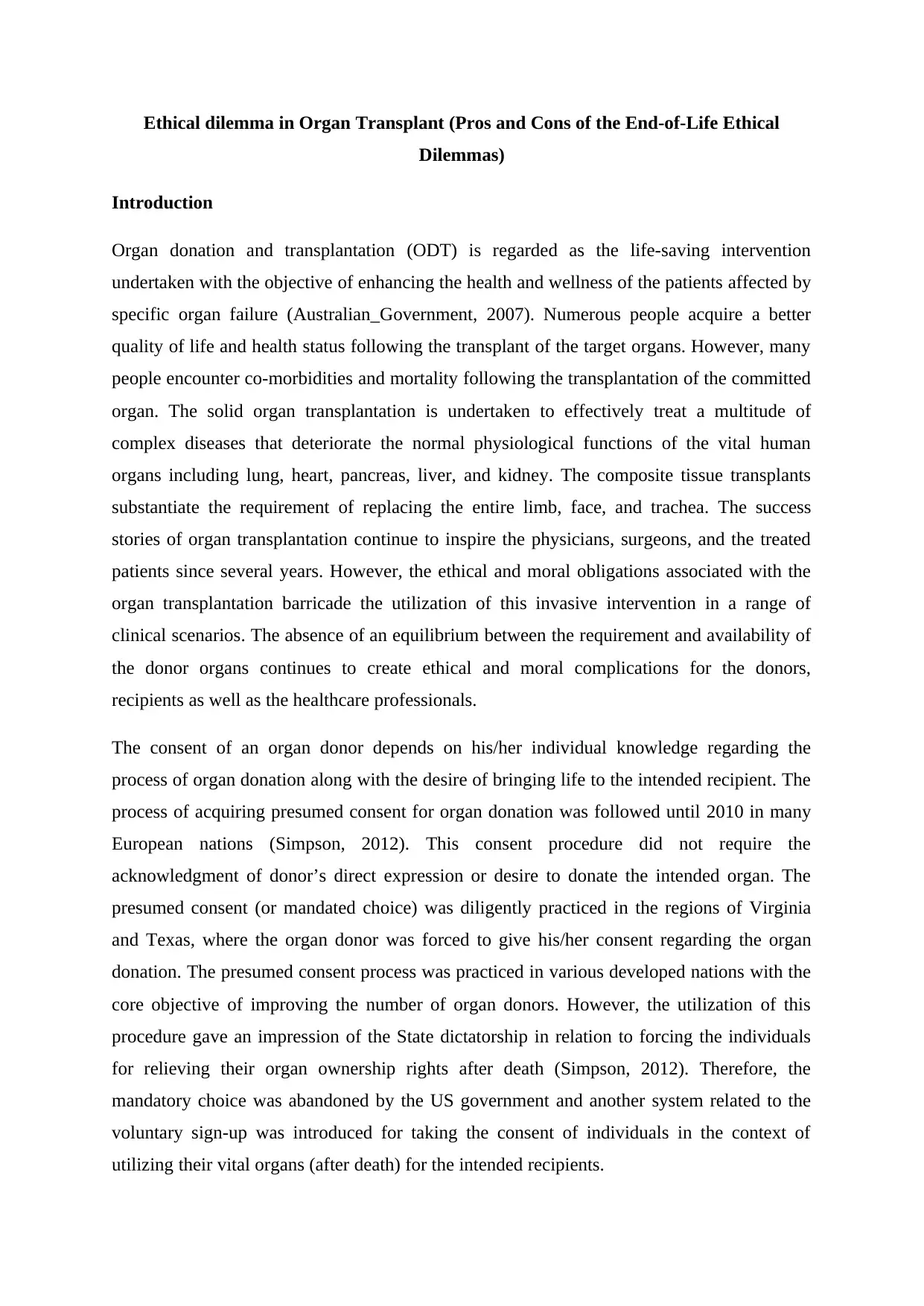
Ethical dilemma in Organ Transplant (Pros and Cons of the End-of-Life Ethical
Dilemmas)
Introduction
Organ donation and transplantation (ODT) is regarded as the life-saving intervention
undertaken with the objective of enhancing the health and wellness of the patients affected by
specific organ failure (Australian_Government, 2007). Numerous people acquire a better
quality of life and health status following the transplant of the target organs. However, many
people encounter co-morbidities and mortality following the transplantation of the committed
organ. The solid organ transplantation is undertaken to effectively treat a multitude of
complex diseases that deteriorate the normal physiological functions of the vital human
organs including lung, heart, pancreas, liver, and kidney. The composite tissue transplants
substantiate the requirement of replacing the entire limb, face, and trachea. The success
stories of organ transplantation continue to inspire the physicians, surgeons, and the treated
patients since several years. However, the ethical and moral obligations associated with the
organ transplantation barricade the utilization of this invasive intervention in a range of
clinical scenarios. The absence of an equilibrium between the requirement and availability of
the donor organs continues to create ethical and moral complications for the donors,
recipients as well as the healthcare professionals.
The consent of an organ donor depends on his/her individual knowledge regarding the
process of organ donation along with the desire of bringing life to the intended recipient. The
process of acquiring presumed consent for organ donation was followed until 2010 in many
European nations (Simpson, 2012). This consent procedure did not require the
acknowledgment of donor’s direct expression or desire to donate the intended organ. The
presumed consent (or mandated choice) was diligently practiced in the regions of Virginia
and Texas, where the organ donor was forced to give his/her consent regarding the organ
donation. The presumed consent process was practiced in various developed nations with the
core objective of improving the number of organ donors. However, the utilization of this
procedure gave an impression of the State dictatorship in relation to forcing the individuals
for relieving their organ ownership rights after death (Simpson, 2012). Therefore, the
mandatory choice was abandoned by the US government and another system related to the
voluntary sign-up was introduced for taking the consent of individuals in the context of
utilizing their vital organs (after death) for the intended recipients.
Dilemmas)
Introduction
Organ donation and transplantation (ODT) is regarded as the life-saving intervention
undertaken with the objective of enhancing the health and wellness of the patients affected by
specific organ failure (Australian_Government, 2007). Numerous people acquire a better
quality of life and health status following the transplant of the target organs. However, many
people encounter co-morbidities and mortality following the transplantation of the committed
organ. The solid organ transplantation is undertaken to effectively treat a multitude of
complex diseases that deteriorate the normal physiological functions of the vital human
organs including lung, heart, pancreas, liver, and kidney. The composite tissue transplants
substantiate the requirement of replacing the entire limb, face, and trachea. The success
stories of organ transplantation continue to inspire the physicians, surgeons, and the treated
patients since several years. However, the ethical and moral obligations associated with the
organ transplantation barricade the utilization of this invasive intervention in a range of
clinical scenarios. The absence of an equilibrium between the requirement and availability of
the donor organs continues to create ethical and moral complications for the donors,
recipients as well as the healthcare professionals.
The consent of an organ donor depends on his/her individual knowledge regarding the
process of organ donation along with the desire of bringing life to the intended recipient. The
process of acquiring presumed consent for organ donation was followed until 2010 in many
European nations (Simpson, 2012). This consent procedure did not require the
acknowledgment of donor’s direct expression or desire to donate the intended organ. The
presumed consent (or mandated choice) was diligently practiced in the regions of Virginia
and Texas, where the organ donor was forced to give his/her consent regarding the organ
donation. The presumed consent process was practiced in various developed nations with the
core objective of improving the number of organ donors. However, the utilization of this
procedure gave an impression of the State dictatorship in relation to forcing the individuals
for relieving their organ ownership rights after death (Simpson, 2012). Therefore, the
mandatory choice was abandoned by the US government and another system related to the
voluntary sign-up was introduced for taking the consent of individuals in the context of
utilizing their vital organs (after death) for the intended recipients.
Paraphrase This Document
Need a fresh take? Get an instant paraphrase of this document with our AI Paraphraser
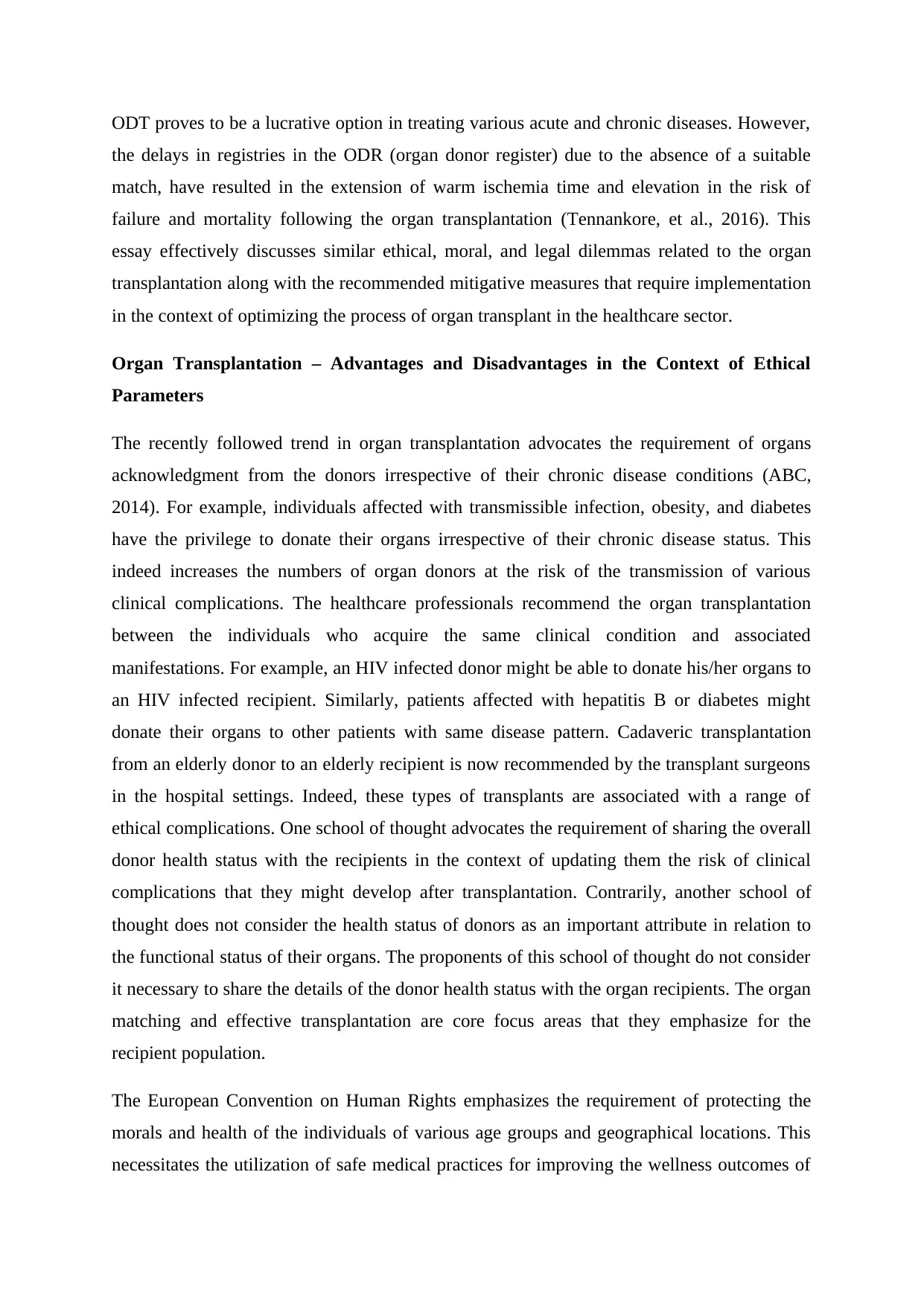
ODT proves to be a lucrative option in treating various acute and chronic diseases. However,
the delays in registries in the ODR (organ donor register) due to the absence of a suitable
match, have resulted in the extension of warm ischemia time and elevation in the risk of
failure and mortality following the organ transplantation (Tennankore, et al., 2016). This
essay effectively discusses similar ethical, moral, and legal dilemmas related to the organ
transplantation along with the recommended mitigative measures that require implementation
in the context of optimizing the process of organ transplant in the healthcare sector.
Organ Transplantation – Advantages and Disadvantages in the Context of Ethical
Parameters
The recently followed trend in organ transplantation advocates the requirement of organs
acknowledgment from the donors irrespective of their chronic disease conditions (ABC,
2014). For example, individuals affected with transmissible infection, obesity, and diabetes
have the privilege to donate their organs irrespective of their chronic disease status. This
indeed increases the numbers of organ donors at the risk of the transmission of various
clinical complications. The healthcare professionals recommend the organ transplantation
between the individuals who acquire the same clinical condition and associated
manifestations. For example, an HIV infected donor might be able to donate his/her organs to
an HIV infected recipient. Similarly, patients affected with hepatitis B or diabetes might
donate their organs to other patients with same disease pattern. Cadaveric transplantation
from an elderly donor to an elderly recipient is now recommended by the transplant surgeons
in the hospital settings. Indeed, these types of transplants are associated with a range of
ethical complications. One school of thought advocates the requirement of sharing the overall
donor health status with the recipients in the context of updating them the risk of clinical
complications that they might develop after transplantation. Contrarily, another school of
thought does not consider the health status of donors as an important attribute in relation to
the functional status of their organs. The proponents of this school of thought do not consider
it necessary to share the details of the donor health status with the organ recipients. The organ
matching and effective transplantation are core focus areas that they emphasize for the
recipient population.
The European Convention on Human Rights emphasizes the requirement of protecting the
morals and health of the individuals of various age groups and geographical locations. This
necessitates the utilization of safe medical practices for improving the wellness outcomes of
the delays in registries in the ODR (organ donor register) due to the absence of a suitable
match, have resulted in the extension of warm ischemia time and elevation in the risk of
failure and mortality following the organ transplantation (Tennankore, et al., 2016). This
essay effectively discusses similar ethical, moral, and legal dilemmas related to the organ
transplantation along with the recommended mitigative measures that require implementation
in the context of optimizing the process of organ transplant in the healthcare sector.
Organ Transplantation – Advantages and Disadvantages in the Context of Ethical
Parameters
The recently followed trend in organ transplantation advocates the requirement of organs
acknowledgment from the donors irrespective of their chronic disease conditions (ABC,
2014). For example, individuals affected with transmissible infection, obesity, and diabetes
have the privilege to donate their organs irrespective of their chronic disease status. This
indeed increases the numbers of organ donors at the risk of the transmission of various
clinical complications. The healthcare professionals recommend the organ transplantation
between the individuals who acquire the same clinical condition and associated
manifestations. For example, an HIV infected donor might be able to donate his/her organs to
an HIV infected recipient. Similarly, patients affected with hepatitis B or diabetes might
donate their organs to other patients with same disease pattern. Cadaveric transplantation
from an elderly donor to an elderly recipient is now recommended by the transplant surgeons
in the hospital settings. Indeed, these types of transplants are associated with a range of
ethical complications. One school of thought advocates the requirement of sharing the overall
donor health status with the recipients in the context of updating them the risk of clinical
complications that they might develop after transplantation. Contrarily, another school of
thought does not consider the health status of donors as an important attribute in relation to
the functional status of their organs. The proponents of this school of thought do not consider
it necessary to share the details of the donor health status with the organ recipients. The organ
matching and effective transplantation are core focus areas that they emphasize for the
recipient population.
The European Convention on Human Rights emphasizes the requirement of protecting the
morals and health of the individuals of various age groups and geographical locations. This
necessitates the utilization of safe medical practices for improving the wellness outcomes of
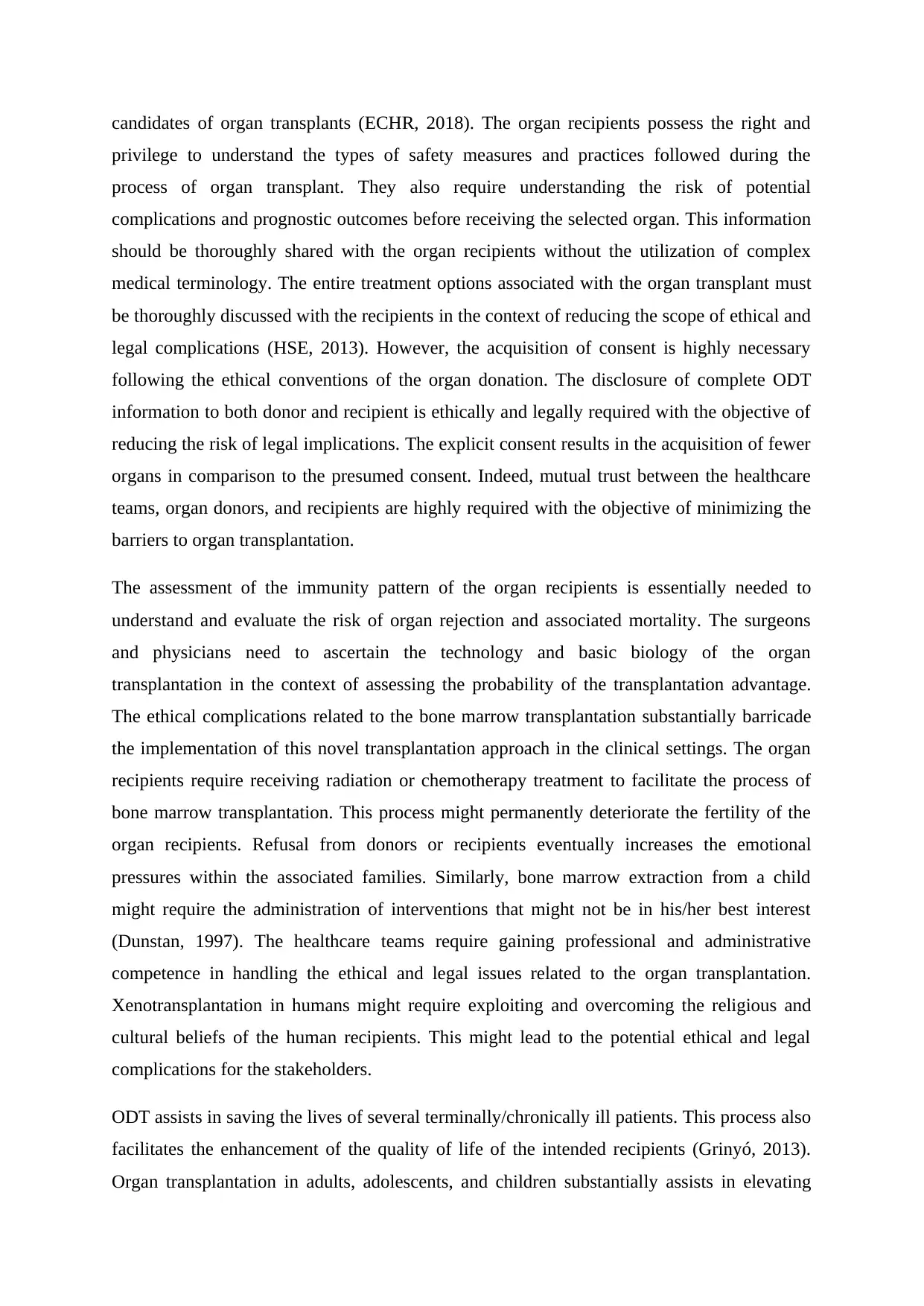
candidates of organ transplants (ECHR, 2018). The organ recipients possess the right and
privilege to understand the types of safety measures and practices followed during the
process of organ transplant. They also require understanding the risk of potential
complications and prognostic outcomes before receiving the selected organ. This information
should be thoroughly shared with the organ recipients without the utilization of complex
medical terminology. The entire treatment options associated with the organ transplant must
be thoroughly discussed with the recipients in the context of reducing the scope of ethical and
legal complications (HSE, 2013). However, the acquisition of consent is highly necessary
following the ethical conventions of the organ donation. The disclosure of complete ODT
information to both donor and recipient is ethically and legally required with the objective of
reducing the risk of legal implications. The explicit consent results in the acquisition of fewer
organs in comparison to the presumed consent. Indeed, mutual trust between the healthcare
teams, organ donors, and recipients are highly required with the objective of minimizing the
barriers to organ transplantation.
The assessment of the immunity pattern of the organ recipients is essentially needed to
understand and evaluate the risk of organ rejection and associated mortality. The surgeons
and physicians need to ascertain the technology and basic biology of the organ
transplantation in the context of assessing the probability of the transplantation advantage.
The ethical complications related to the bone marrow transplantation substantially barricade
the implementation of this novel transplantation approach in the clinical settings. The organ
recipients require receiving radiation or chemotherapy treatment to facilitate the process of
bone marrow transplantation. This process might permanently deteriorate the fertility of the
organ recipients. Refusal from donors or recipients eventually increases the emotional
pressures within the associated families. Similarly, bone marrow extraction from a child
might require the administration of interventions that might not be in his/her best interest
(Dunstan, 1997). The healthcare teams require gaining professional and administrative
competence in handling the ethical and legal issues related to the organ transplantation.
Xenotransplantation in humans might require exploiting and overcoming the religious and
cultural beliefs of the human recipients. This might lead to the potential ethical and legal
complications for the stakeholders.
ODT assists in saving the lives of several terminally/chronically ill patients. This process also
facilitates the enhancement of the quality of life of the intended recipients (Grinyó, 2013).
Organ transplantation in adults, adolescents, and children substantially assists in elevating
privilege to understand the types of safety measures and practices followed during the
process of organ transplant. They also require understanding the risk of potential
complications and prognostic outcomes before receiving the selected organ. This information
should be thoroughly shared with the organ recipients without the utilization of complex
medical terminology. The entire treatment options associated with the organ transplant must
be thoroughly discussed with the recipients in the context of reducing the scope of ethical and
legal complications (HSE, 2013). However, the acquisition of consent is highly necessary
following the ethical conventions of the organ donation. The disclosure of complete ODT
information to both donor and recipient is ethically and legally required with the objective of
reducing the risk of legal implications. The explicit consent results in the acquisition of fewer
organs in comparison to the presumed consent. Indeed, mutual trust between the healthcare
teams, organ donors, and recipients are highly required with the objective of minimizing the
barriers to organ transplantation.
The assessment of the immunity pattern of the organ recipients is essentially needed to
understand and evaluate the risk of organ rejection and associated mortality. The surgeons
and physicians need to ascertain the technology and basic biology of the organ
transplantation in the context of assessing the probability of the transplantation advantage.
The ethical complications related to the bone marrow transplantation substantially barricade
the implementation of this novel transplantation approach in the clinical settings. The organ
recipients require receiving radiation or chemotherapy treatment to facilitate the process of
bone marrow transplantation. This process might permanently deteriorate the fertility of the
organ recipients. Refusal from donors or recipients eventually increases the emotional
pressures within the associated families. Similarly, bone marrow extraction from a child
might require the administration of interventions that might not be in his/her best interest
(Dunstan, 1997). The healthcare teams require gaining professional and administrative
competence in handling the ethical and legal issues related to the organ transplantation.
Xenotransplantation in humans might require exploiting and overcoming the religious and
cultural beliefs of the human recipients. This might lead to the potential ethical and legal
complications for the stakeholders.
ODT assists in saving the lives of several terminally/chronically ill patients. This process also
facilitates the enhancement of the quality of life of the intended recipients (Grinyó, 2013).
Organ transplantation in adults, adolescents, and children substantially assists in elevating
⊘ This is a preview!⊘
Do you want full access?
Subscribe today to unlock all pages.

Trusted by 1+ million students worldwide
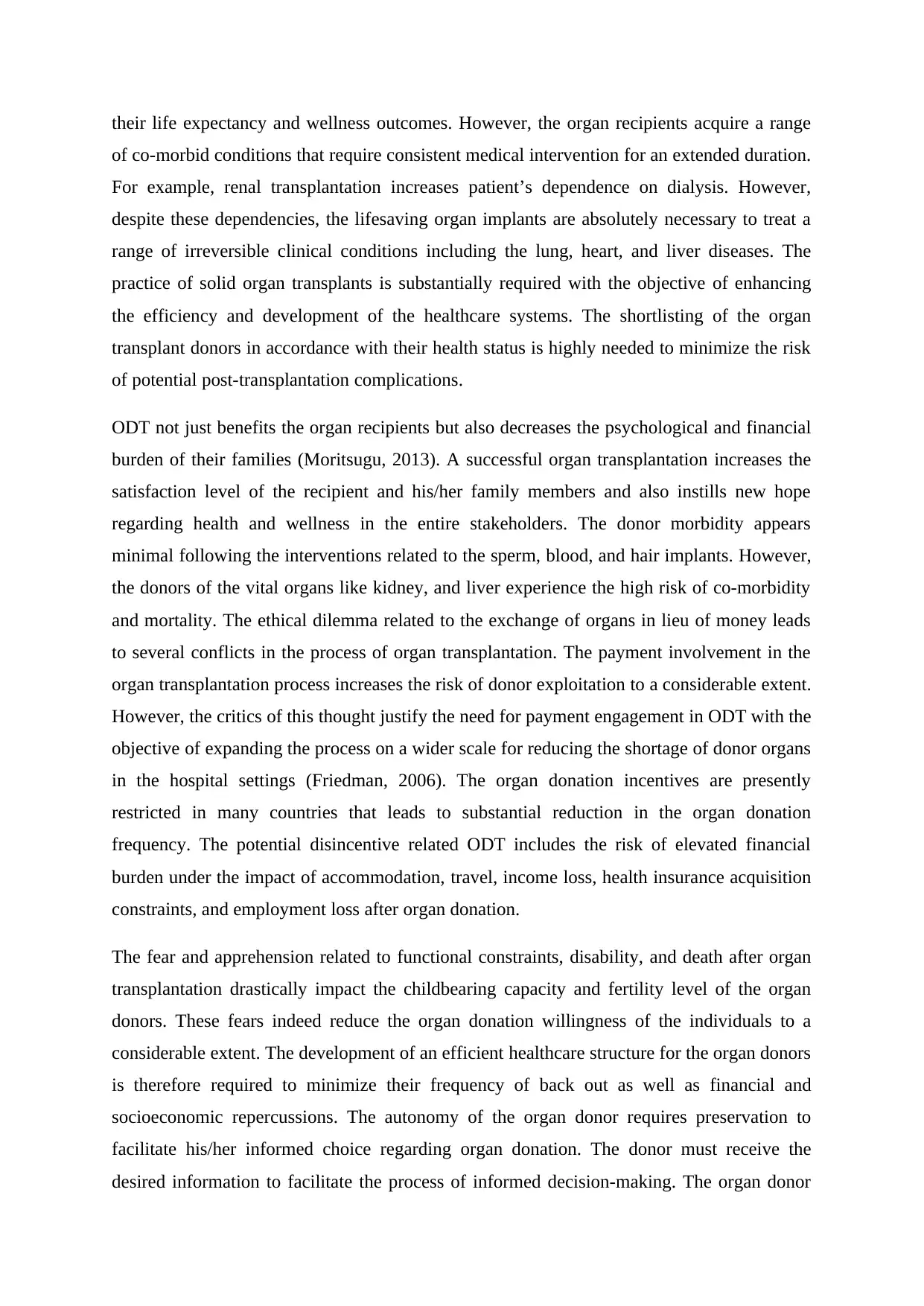
their life expectancy and wellness outcomes. However, the organ recipients acquire a range
of co-morbid conditions that require consistent medical intervention for an extended duration.
For example, renal transplantation increases patient’s dependence on dialysis. However,
despite these dependencies, the lifesaving organ implants are absolutely necessary to treat a
range of irreversible clinical conditions including the lung, heart, and liver diseases. The
practice of solid organ transplants is substantially required with the objective of enhancing
the efficiency and development of the healthcare systems. The shortlisting of the organ
transplant donors in accordance with their health status is highly needed to minimize the risk
of potential post-transplantation complications.
ODT not just benefits the organ recipients but also decreases the psychological and financial
burden of their families (Moritsugu, 2013). A successful organ transplantation increases the
satisfaction level of the recipient and his/her family members and also instills new hope
regarding health and wellness in the entire stakeholders. The donor morbidity appears
minimal following the interventions related to the sperm, blood, and hair implants. However,
the donors of the vital organs like kidney, and liver experience the high risk of co-morbidity
and mortality. The ethical dilemma related to the exchange of organs in lieu of money leads
to several conflicts in the process of organ transplantation. The payment involvement in the
organ transplantation process increases the risk of donor exploitation to a considerable extent.
However, the critics of this thought justify the need for payment engagement in ODT with the
objective of expanding the process on a wider scale for reducing the shortage of donor organs
in the hospital settings (Friedman, 2006). The organ donation incentives are presently
restricted in many countries that leads to substantial reduction in the organ donation
frequency. The potential disincentive related ODT includes the risk of elevated financial
burden under the impact of accommodation, travel, income loss, health insurance acquisition
constraints, and employment loss after organ donation.
The fear and apprehension related to functional constraints, disability, and death after organ
transplantation drastically impact the childbearing capacity and fertility level of the organ
donors. These fears indeed reduce the organ donation willingness of the individuals to a
considerable extent. The development of an efficient healthcare structure for the organ donors
is therefore required to minimize their frequency of back out as well as financial and
socioeconomic repercussions. The autonomy of the organ donor requires preservation to
facilitate his/her informed choice regarding organ donation. The donor must receive the
desired information to facilitate the process of informed decision-making. The organ donor
of co-morbid conditions that require consistent medical intervention for an extended duration.
For example, renal transplantation increases patient’s dependence on dialysis. However,
despite these dependencies, the lifesaving organ implants are absolutely necessary to treat a
range of irreversible clinical conditions including the lung, heart, and liver diseases. The
practice of solid organ transplants is substantially required with the objective of enhancing
the efficiency and development of the healthcare systems. The shortlisting of the organ
transplant donors in accordance with their health status is highly needed to minimize the risk
of potential post-transplantation complications.
ODT not just benefits the organ recipients but also decreases the psychological and financial
burden of their families (Moritsugu, 2013). A successful organ transplantation increases the
satisfaction level of the recipient and his/her family members and also instills new hope
regarding health and wellness in the entire stakeholders. The donor morbidity appears
minimal following the interventions related to the sperm, blood, and hair implants. However,
the donors of the vital organs like kidney, and liver experience the high risk of co-morbidity
and mortality. The ethical dilemma related to the exchange of organs in lieu of money leads
to several conflicts in the process of organ transplantation. The payment involvement in the
organ transplantation process increases the risk of donor exploitation to a considerable extent.
However, the critics of this thought justify the need for payment engagement in ODT with the
objective of expanding the process on a wider scale for reducing the shortage of donor organs
in the hospital settings (Friedman, 2006). The organ donation incentives are presently
restricted in many countries that leads to substantial reduction in the organ donation
frequency. The potential disincentive related ODT includes the risk of elevated financial
burden under the impact of accommodation, travel, income loss, health insurance acquisition
constraints, and employment loss after organ donation.
The fear and apprehension related to functional constraints, disability, and death after organ
transplantation drastically impact the childbearing capacity and fertility level of the organ
donors. These fears indeed reduce the organ donation willingness of the individuals to a
considerable extent. The development of an efficient healthcare structure for the organ donors
is therefore required to minimize their frequency of back out as well as financial and
socioeconomic repercussions. The autonomy of the organ donor requires preservation to
facilitate his/her informed choice regarding organ donation. The donor must receive the
desired information to facilitate the process of informed decision-making. The organ donor
Paraphrase This Document
Need a fresh take? Get an instant paraphrase of this document with our AI Paraphraser
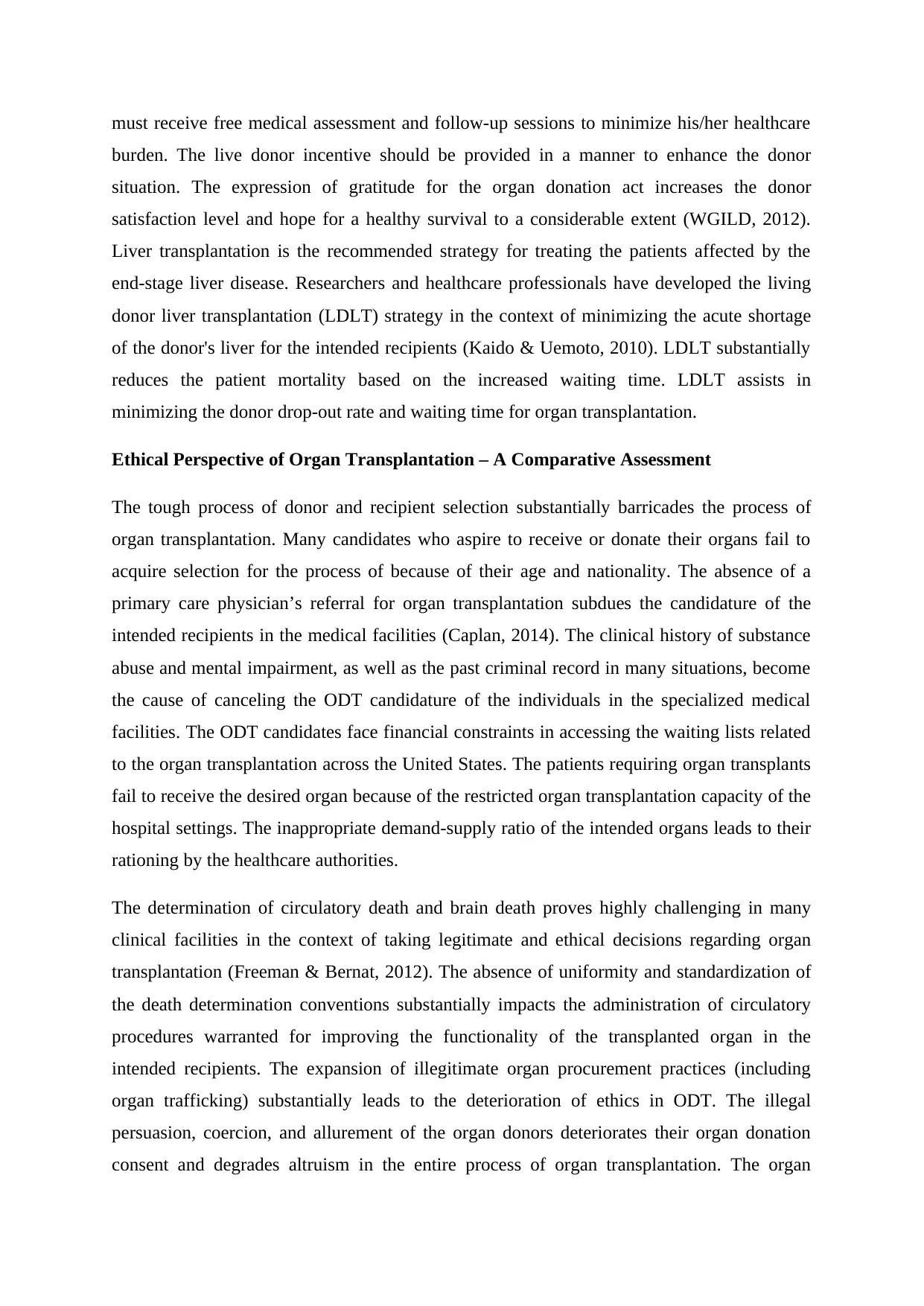
must receive free medical assessment and follow-up sessions to minimize his/her healthcare
burden. The live donor incentive should be provided in a manner to enhance the donor
situation. The expression of gratitude for the organ donation act increases the donor
satisfaction level and hope for a healthy survival to a considerable extent (WGILD, 2012).
Liver transplantation is the recommended strategy for treating the patients affected by the
end-stage liver disease. Researchers and healthcare professionals have developed the living
donor liver transplantation (LDLT) strategy in the context of minimizing the acute shortage
of the donor's liver for the intended recipients (Kaido & Uemoto, 2010). LDLT substantially
reduces the patient mortality based on the increased waiting time. LDLT assists in
minimizing the donor drop-out rate and waiting time for organ transplantation.
Ethical Perspective of Organ Transplantation – A Comparative Assessment
The tough process of donor and recipient selection substantially barricades the process of
organ transplantation. Many candidates who aspire to receive or donate their organs fail to
acquire selection for the process of because of their age and nationality. The absence of a
primary care physician’s referral for organ transplantation subdues the candidature of the
intended recipients in the medical facilities (Caplan, 2014). The clinical history of substance
abuse and mental impairment, as well as the past criminal record in many situations, become
the cause of canceling the ODT candidature of the individuals in the specialized medical
facilities. The ODT candidates face financial constraints in accessing the waiting lists related
to the organ transplantation across the United States. The patients requiring organ transplants
fail to receive the desired organ because of the restricted organ transplantation capacity of the
hospital settings. The inappropriate demand-supply ratio of the intended organs leads to their
rationing by the healthcare authorities.
The determination of circulatory death and brain death proves highly challenging in many
clinical facilities in the context of taking legitimate and ethical decisions regarding organ
transplantation (Freeman & Bernat, 2012). The absence of uniformity and standardization of
the death determination conventions substantially impacts the administration of circulatory
procedures warranted for improving the functionality of the transplanted organ in the
intended recipients. The expansion of illegitimate organ procurement practices (including
organ trafficking) substantially leads to the deterioration of ethics in ODT. The illegal
persuasion, coercion, and allurement of the organ donors deteriorates their organ donation
consent and degrades altruism in the entire process of organ transplantation. The organ
burden. The live donor incentive should be provided in a manner to enhance the donor
situation. The expression of gratitude for the organ donation act increases the donor
satisfaction level and hope for a healthy survival to a considerable extent (WGILD, 2012).
Liver transplantation is the recommended strategy for treating the patients affected by the
end-stage liver disease. Researchers and healthcare professionals have developed the living
donor liver transplantation (LDLT) strategy in the context of minimizing the acute shortage
of the donor's liver for the intended recipients (Kaido & Uemoto, 2010). LDLT substantially
reduces the patient mortality based on the increased waiting time. LDLT assists in
minimizing the donor drop-out rate and waiting time for organ transplantation.
Ethical Perspective of Organ Transplantation – A Comparative Assessment
The tough process of donor and recipient selection substantially barricades the process of
organ transplantation. Many candidates who aspire to receive or donate their organs fail to
acquire selection for the process of because of their age and nationality. The absence of a
primary care physician’s referral for organ transplantation subdues the candidature of the
intended recipients in the medical facilities (Caplan, 2014). The clinical history of substance
abuse and mental impairment, as well as the past criminal record in many situations, become
the cause of canceling the ODT candidature of the individuals in the specialized medical
facilities. The ODT candidates face financial constraints in accessing the waiting lists related
to the organ transplantation across the United States. The patients requiring organ transplants
fail to receive the desired organ because of the restricted organ transplantation capacity of the
hospital settings. The inappropriate demand-supply ratio of the intended organs leads to their
rationing by the healthcare authorities.
The determination of circulatory death and brain death proves highly challenging in many
clinical facilities in the context of taking legitimate and ethical decisions regarding organ
transplantation (Freeman & Bernat, 2012). The absence of uniformity and standardization of
the death determination conventions substantially impacts the administration of circulatory
procedures warranted for improving the functionality of the transplanted organ in the
intended recipients. The expansion of illegitimate organ procurement practices (including
organ trafficking) substantially leads to the deterioration of ethics in ODT. The illegal
persuasion, coercion, and allurement of the organ donors deteriorates their organ donation
consent and degrades altruism in the entire process of organ transplantation. The organ
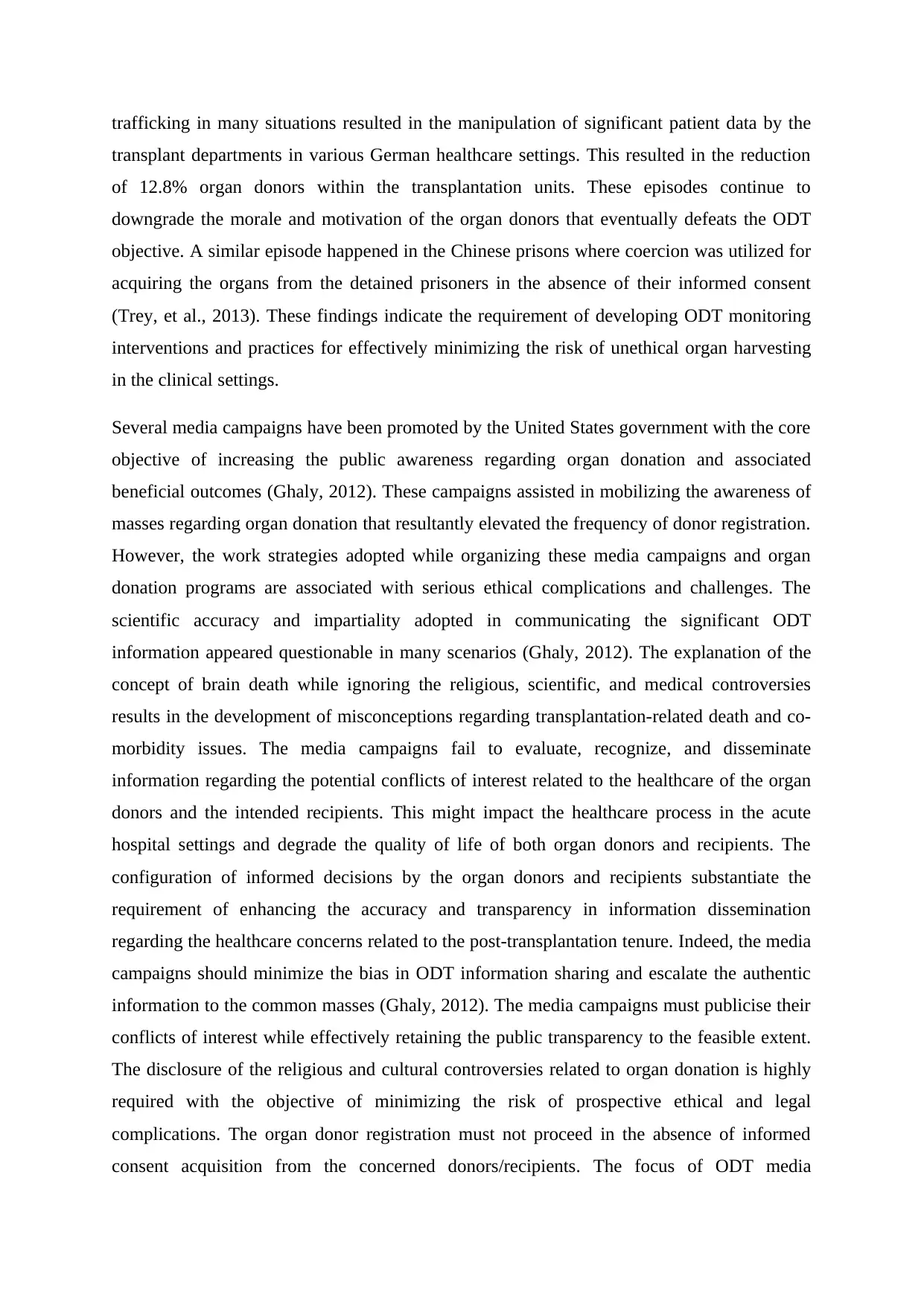
trafficking in many situations resulted in the manipulation of significant patient data by the
transplant departments in various German healthcare settings. This resulted in the reduction
of 12.8% organ donors within the transplantation units. These episodes continue to
downgrade the morale and motivation of the organ donors that eventually defeats the ODT
objective. A similar episode happened in the Chinese prisons where coercion was utilized for
acquiring the organs from the detained prisoners in the absence of their informed consent
(Trey, et al., 2013). These findings indicate the requirement of developing ODT monitoring
interventions and practices for effectively minimizing the risk of unethical organ harvesting
in the clinical settings.
Several media campaigns have been promoted by the United States government with the core
objective of increasing the public awareness regarding organ donation and associated
beneficial outcomes (Ghaly, 2012). These campaigns assisted in mobilizing the awareness of
masses regarding organ donation that resultantly elevated the frequency of donor registration.
However, the work strategies adopted while organizing these media campaigns and organ
donation programs are associated with serious ethical complications and challenges. The
scientific accuracy and impartiality adopted in communicating the significant ODT
information appeared questionable in many scenarios (Ghaly, 2012). The explanation of the
concept of brain death while ignoring the religious, scientific, and medical controversies
results in the development of misconceptions regarding transplantation-related death and co-
morbidity issues. The media campaigns fail to evaluate, recognize, and disseminate
information regarding the potential conflicts of interest related to the healthcare of the organ
donors and the intended recipients. This might impact the healthcare process in the acute
hospital settings and degrade the quality of life of both organ donors and recipients. The
configuration of informed decisions by the organ donors and recipients substantiate the
requirement of enhancing the accuracy and transparency in information dissemination
regarding the healthcare concerns related to the post-transplantation tenure. Indeed, the media
campaigns should minimize the bias in ODT information sharing and escalate the authentic
information to the common masses (Ghaly, 2012). The media campaigns must publicise their
conflicts of interest while effectively retaining the public transparency to the feasible extent.
The disclosure of the religious and cultural controversies related to organ donation is highly
required with the objective of minimizing the risk of prospective ethical and legal
complications. The organ donor registration must not proceed in the absence of informed
consent acquisition from the concerned donors/recipients. The focus of ODT media
transplant departments in various German healthcare settings. This resulted in the reduction
of 12.8% organ donors within the transplantation units. These episodes continue to
downgrade the morale and motivation of the organ donors that eventually defeats the ODT
objective. A similar episode happened in the Chinese prisons where coercion was utilized for
acquiring the organs from the detained prisoners in the absence of their informed consent
(Trey, et al., 2013). These findings indicate the requirement of developing ODT monitoring
interventions and practices for effectively minimizing the risk of unethical organ harvesting
in the clinical settings.
Several media campaigns have been promoted by the United States government with the core
objective of increasing the public awareness regarding organ donation and associated
beneficial outcomes (Ghaly, 2012). These campaigns assisted in mobilizing the awareness of
masses regarding organ donation that resultantly elevated the frequency of donor registration.
However, the work strategies adopted while organizing these media campaigns and organ
donation programs are associated with serious ethical complications and challenges. The
scientific accuracy and impartiality adopted in communicating the significant ODT
information appeared questionable in many scenarios (Ghaly, 2012). The explanation of the
concept of brain death while ignoring the religious, scientific, and medical controversies
results in the development of misconceptions regarding transplantation-related death and co-
morbidity issues. The media campaigns fail to evaluate, recognize, and disseminate
information regarding the potential conflicts of interest related to the healthcare of the organ
donors and the intended recipients. This might impact the healthcare process in the acute
hospital settings and degrade the quality of life of both organ donors and recipients. The
configuration of informed decisions by the organ donors and recipients substantiate the
requirement of enhancing the accuracy and transparency in information dissemination
regarding the healthcare concerns related to the post-transplantation tenure. Indeed, the media
campaigns should minimize the bias in ODT information sharing and escalate the authentic
information to the common masses (Ghaly, 2012). The media campaigns must publicise their
conflicts of interest while effectively retaining the public transparency to the feasible extent.
The disclosure of the religious and cultural controversies related to organ donation is highly
required with the objective of minimizing the risk of prospective ethical and legal
complications. The organ donor registration must not proceed in the absence of informed
consent acquisition from the concerned donors/recipients. The focus of ODT media
⊘ This is a preview!⊘
Do you want full access?
Subscribe today to unlock all pages.

Trusted by 1+ million students worldwide
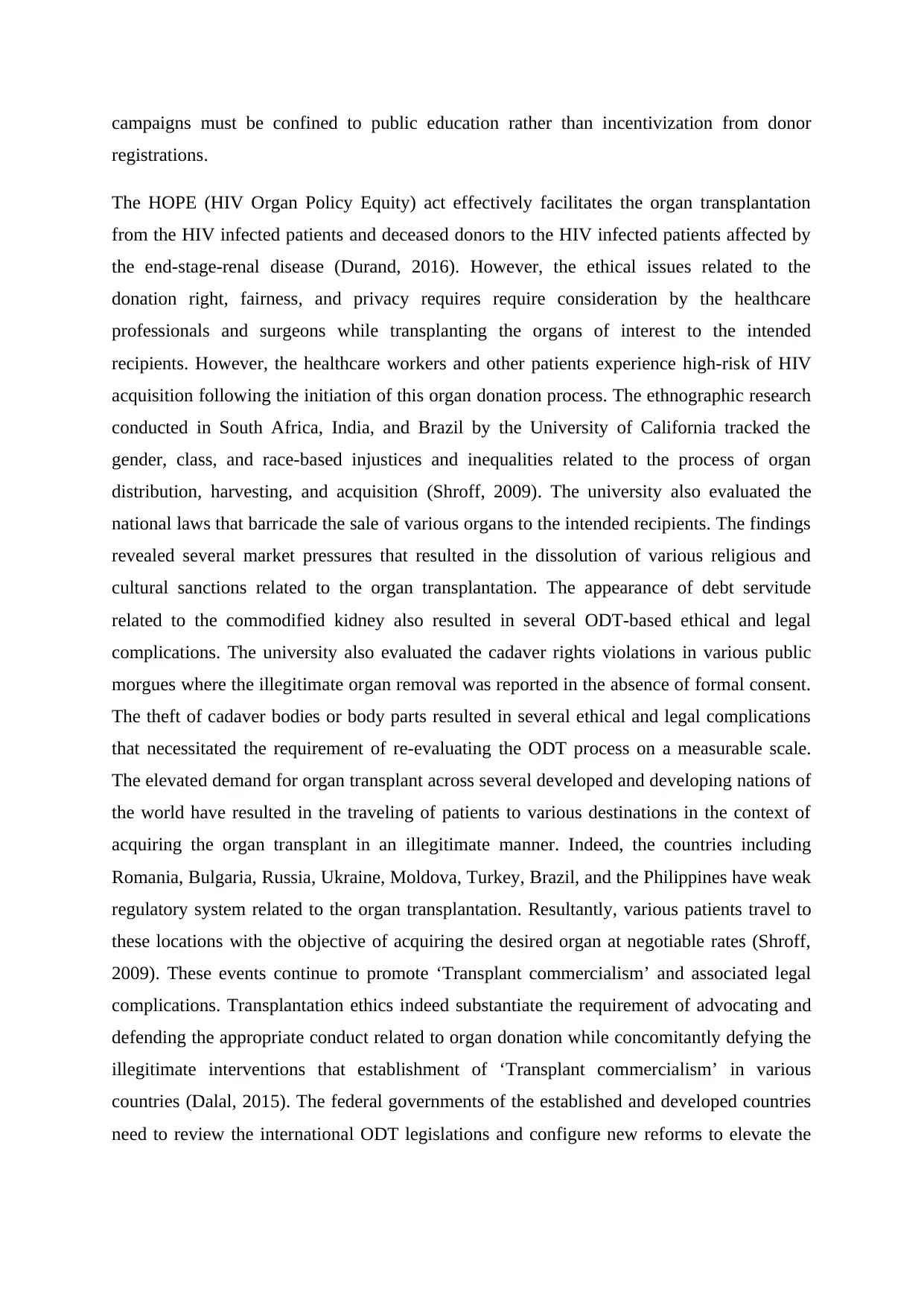
campaigns must be confined to public education rather than incentivization from donor
registrations.
The HOPE (HIV Organ Policy Equity) act effectively facilitates the organ transplantation
from the HIV infected patients and deceased donors to the HIV infected patients affected by
the end-stage-renal disease (Durand, 2016). However, the ethical issues related to the
donation right, fairness, and privacy requires require consideration by the healthcare
professionals and surgeons while transplanting the organs of interest to the intended
recipients. However, the healthcare workers and other patients experience high-risk of HIV
acquisition following the initiation of this organ donation process. The ethnographic research
conducted in South Africa, India, and Brazil by the University of California tracked the
gender, class, and race-based injustices and inequalities related to the process of organ
distribution, harvesting, and acquisition (Shroff, 2009). The university also evaluated the
national laws that barricade the sale of various organs to the intended recipients. The findings
revealed several market pressures that resulted in the dissolution of various religious and
cultural sanctions related to the organ transplantation. The appearance of debt servitude
related to the commodified kidney also resulted in several ODT-based ethical and legal
complications. The university also evaluated the cadaver rights violations in various public
morgues where the illegitimate organ removal was reported in the absence of formal consent.
The theft of cadaver bodies or body parts resulted in several ethical and legal complications
that necessitated the requirement of re-evaluating the ODT process on a measurable scale.
The elevated demand for organ transplant across several developed and developing nations of
the world have resulted in the traveling of patients to various destinations in the context of
acquiring the organ transplant in an illegitimate manner. Indeed, the countries including
Romania, Bulgaria, Russia, Ukraine, Moldova, Turkey, Brazil, and the Philippines have weak
regulatory system related to the organ transplantation. Resultantly, various patients travel to
these locations with the objective of acquiring the desired organ at negotiable rates (Shroff,
2009). These events continue to promote ‘Transplant commercialism’ and associated legal
complications. Transplantation ethics indeed substantiate the requirement of advocating and
defending the appropriate conduct related to organ donation while concomitantly defying the
illegitimate interventions that establishment of ‘Transplant commercialism’ in various
countries (Dalal, 2015). The federal governments of the established and developed countries
need to review the international ODT legislations and configure new reforms to elevate the
registrations.
The HOPE (HIV Organ Policy Equity) act effectively facilitates the organ transplantation
from the HIV infected patients and deceased donors to the HIV infected patients affected by
the end-stage-renal disease (Durand, 2016). However, the ethical issues related to the
donation right, fairness, and privacy requires require consideration by the healthcare
professionals and surgeons while transplanting the organs of interest to the intended
recipients. However, the healthcare workers and other patients experience high-risk of HIV
acquisition following the initiation of this organ donation process. The ethnographic research
conducted in South Africa, India, and Brazil by the University of California tracked the
gender, class, and race-based injustices and inequalities related to the process of organ
distribution, harvesting, and acquisition (Shroff, 2009). The university also evaluated the
national laws that barricade the sale of various organs to the intended recipients. The findings
revealed several market pressures that resulted in the dissolution of various religious and
cultural sanctions related to the organ transplantation. The appearance of debt servitude
related to the commodified kidney also resulted in several ODT-based ethical and legal
complications. The university also evaluated the cadaver rights violations in various public
morgues where the illegitimate organ removal was reported in the absence of formal consent.
The theft of cadaver bodies or body parts resulted in several ethical and legal complications
that necessitated the requirement of re-evaluating the ODT process on a measurable scale.
The elevated demand for organ transplant across several developed and developing nations of
the world have resulted in the traveling of patients to various destinations in the context of
acquiring the organ transplant in an illegitimate manner. Indeed, the countries including
Romania, Bulgaria, Russia, Ukraine, Moldova, Turkey, Brazil, and the Philippines have weak
regulatory system related to the organ transplantation. Resultantly, various patients travel to
these locations with the objective of acquiring the desired organ at negotiable rates (Shroff,
2009). These events continue to promote ‘Transplant commercialism’ and associated legal
complications. Transplantation ethics indeed substantiate the requirement of advocating and
defending the appropriate conduct related to organ donation while concomitantly defying the
illegitimate interventions that establishment of ‘Transplant commercialism’ in various
countries (Dalal, 2015). The federal governments of the established and developed countries
need to review the international ODT legislations and configure new reforms to elevate the
Paraphrase This Document
Need a fresh take? Get an instant paraphrase of this document with our AI Paraphraser
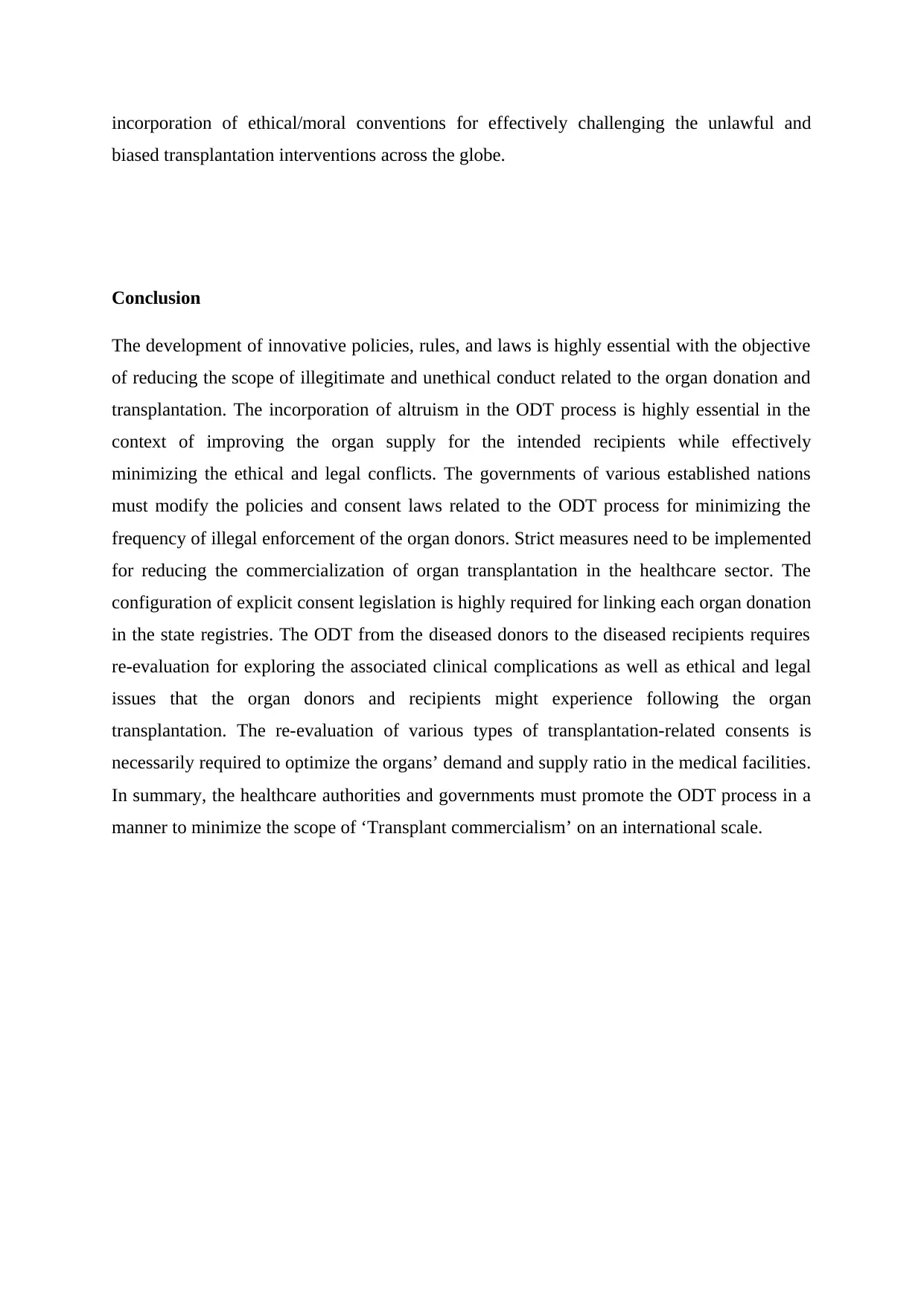
incorporation of ethical/moral conventions for effectively challenging the unlawful and
biased transplantation interventions across the globe.
Conclusion
The development of innovative policies, rules, and laws is highly essential with the objective
of reducing the scope of illegitimate and unethical conduct related to the organ donation and
transplantation. The incorporation of altruism in the ODT process is highly essential in the
context of improving the organ supply for the intended recipients while effectively
minimizing the ethical and legal conflicts. The governments of various established nations
must modify the policies and consent laws related to the ODT process for minimizing the
frequency of illegal enforcement of the organ donors. Strict measures need to be implemented
for reducing the commercialization of organ transplantation in the healthcare sector. The
configuration of explicit consent legislation is highly required for linking each organ donation
in the state registries. The ODT from the diseased donors to the diseased recipients requires
re-evaluation for exploring the associated clinical complications as well as ethical and legal
issues that the organ donors and recipients might experience following the organ
transplantation. The re-evaluation of various types of transplantation-related consents is
necessarily required to optimize the organs’ demand and supply ratio in the medical facilities.
In summary, the healthcare authorities and governments must promote the ODT process in a
manner to minimize the scope of ‘Transplant commercialism’ on an international scale.
biased transplantation interventions across the globe.
Conclusion
The development of innovative policies, rules, and laws is highly essential with the objective
of reducing the scope of illegitimate and unethical conduct related to the organ donation and
transplantation. The incorporation of altruism in the ODT process is highly essential in the
context of improving the organ supply for the intended recipients while effectively
minimizing the ethical and legal conflicts. The governments of various established nations
must modify the policies and consent laws related to the ODT process for minimizing the
frequency of illegal enforcement of the organ donors. Strict measures need to be implemented
for reducing the commercialization of organ transplantation in the healthcare sector. The
configuration of explicit consent legislation is highly required for linking each organ donation
in the state registries. The ODT from the diseased donors to the diseased recipients requires
re-evaluation for exploring the associated clinical complications as well as ethical and legal
issues that the organ donors and recipients might experience following the organ
transplantation. The re-evaluation of various types of transplantation-related consents is
necessarily required to optimize the organs’ demand and supply ratio in the medical facilities.
In summary, the healthcare authorities and governments must promote the ODT process in a
manner to minimize the scope of ‘Transplant commercialism’ on an international scale.
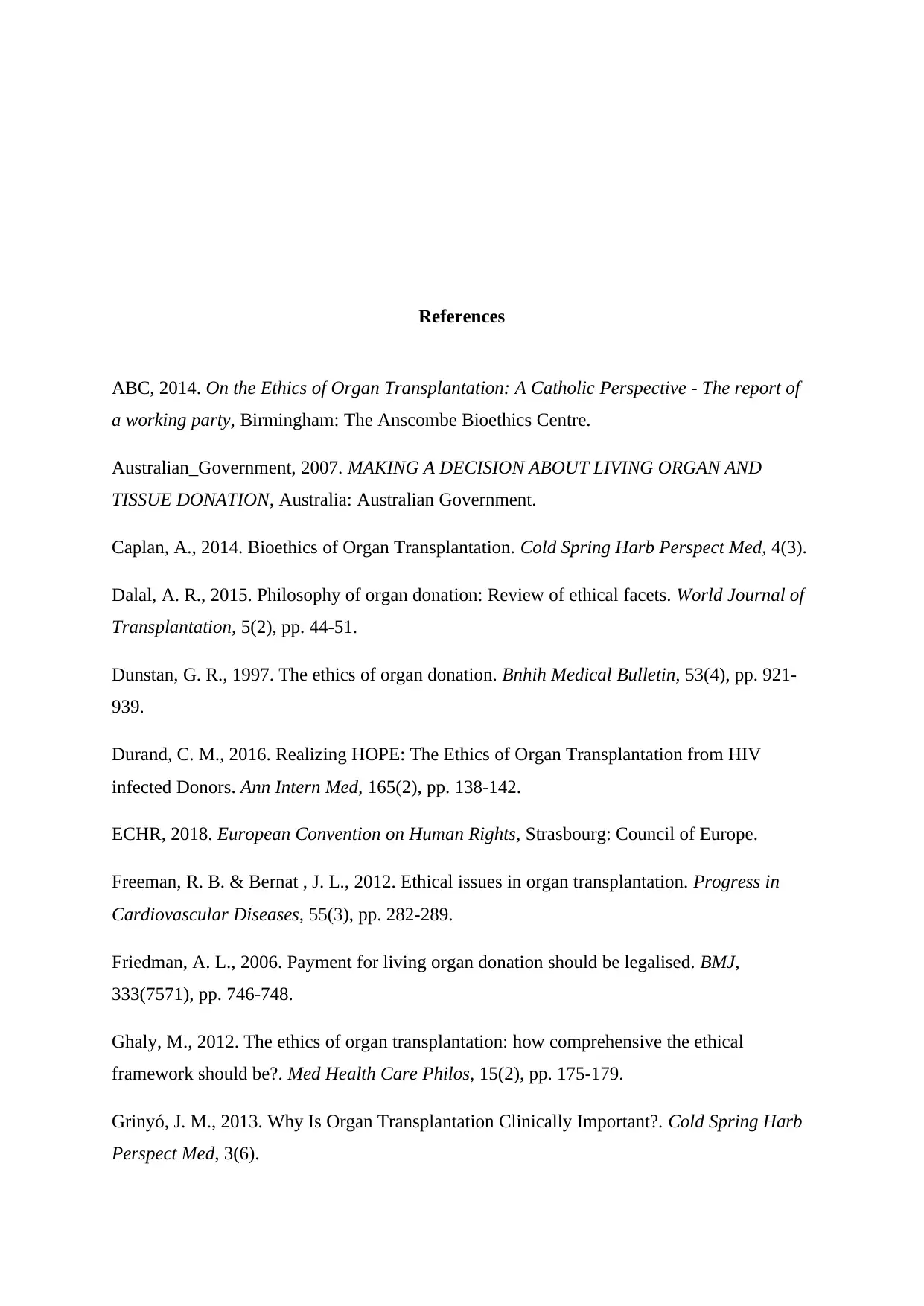
References
ABC, 2014. On the Ethics of Organ Transplantation: A Catholic Perspective - The report of
a working party, Birmingham: The Anscombe Bioethics Centre.
Australian_Government, 2007. MAKING A DECISION ABOUT LIVING ORGAN AND
TISSUE DONATION, Australia: Australian Government.
Caplan, A., 2014. Bioethics of Organ Transplantation. Cold Spring Harb Perspect Med, 4(3).
Dalal, A. R., 2015. Philosophy of organ donation: Review of ethical facets. World Journal of
Transplantation, 5(2), pp. 44-51.
Dunstan, G. R., 1997. The ethics of organ donation. Bnhih Medical Bulletin, 53(4), pp. 921-
939.
Durand, C. M., 2016. Realizing HOPE: The Ethics of Organ Transplantation from HIV
infected Donors. Ann Intern Med, 165(2), pp. 138-142.
ECHR, 2018. European Convention on Human Rights, Strasbourg: Council of Europe.
Freeman, R. B. & Bernat , J. L., 2012. Ethical issues in organ transplantation. Progress in
Cardiovascular Diseases, 55(3), pp. 282-289.
Friedman, A. L., 2006. Payment for living organ donation should be legalised. BMJ,
333(7571), pp. 746-748.
Ghaly, M., 2012. The ethics of organ transplantation: how comprehensive the ethical
framework should be?. Med Health Care Philos, 15(2), pp. 175-179.
Grinyó, J. M., 2013. Why Is Organ Transplantation Clinically Important?. Cold Spring Harb
Perspect Med, 3(6).
ABC, 2014. On the Ethics of Organ Transplantation: A Catholic Perspective - The report of
a working party, Birmingham: The Anscombe Bioethics Centre.
Australian_Government, 2007. MAKING A DECISION ABOUT LIVING ORGAN AND
TISSUE DONATION, Australia: Australian Government.
Caplan, A., 2014. Bioethics of Organ Transplantation. Cold Spring Harb Perspect Med, 4(3).
Dalal, A. R., 2015. Philosophy of organ donation: Review of ethical facets. World Journal of
Transplantation, 5(2), pp. 44-51.
Dunstan, G. R., 1997. The ethics of organ donation. Bnhih Medical Bulletin, 53(4), pp. 921-
939.
Durand, C. M., 2016. Realizing HOPE: The Ethics of Organ Transplantation from HIV
infected Donors. Ann Intern Med, 165(2), pp. 138-142.
ECHR, 2018. European Convention on Human Rights, Strasbourg: Council of Europe.
Freeman, R. B. & Bernat , J. L., 2012. Ethical issues in organ transplantation. Progress in
Cardiovascular Diseases, 55(3), pp. 282-289.
Friedman, A. L., 2006. Payment for living organ donation should be legalised. BMJ,
333(7571), pp. 746-748.
Ghaly, M., 2012. The ethics of organ transplantation: how comprehensive the ethical
framework should be?. Med Health Care Philos, 15(2), pp. 175-179.
Grinyó, J. M., 2013. Why Is Organ Transplantation Clinically Important?. Cold Spring Harb
Perspect Med, 3(6).
⊘ This is a preview!⊘
Do you want full access?
Subscribe today to unlock all pages.

Trusted by 1+ million students worldwide
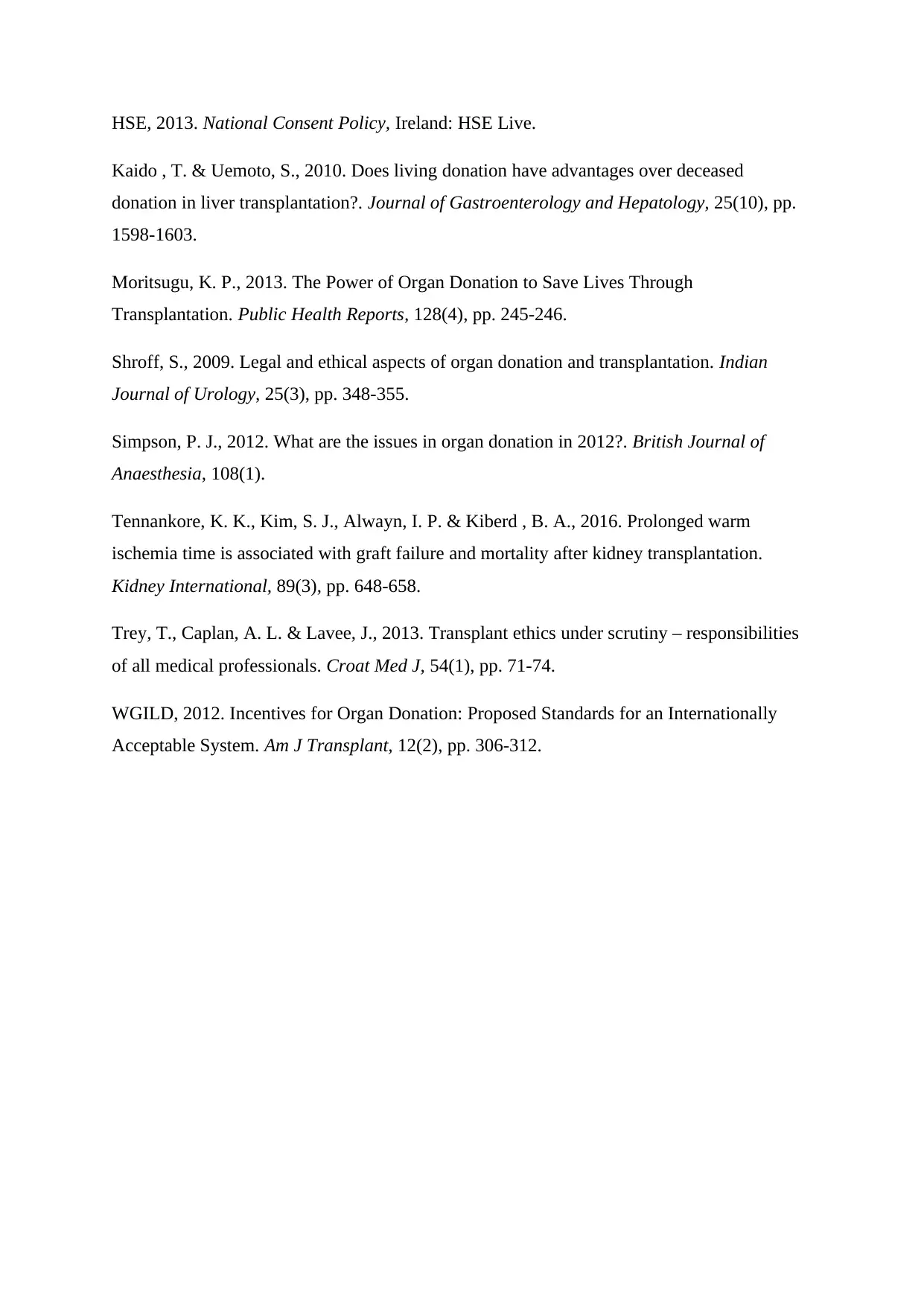
HSE, 2013. National Consent Policy, Ireland: HSE Live.
Kaido , T. & Uemoto, S., 2010. Does living donation have advantages over deceased
donation in liver transplantation?. Journal of Gastroenterology and Hepatology, 25(10), pp.
1598-1603.
Moritsugu, K. P., 2013. The Power of Organ Donation to Save Lives Through
Transplantation. Public Health Reports, 128(4), pp. 245-246.
Shroff, S., 2009. Legal and ethical aspects of organ donation and transplantation. Indian
Journal of Urology, 25(3), pp. 348-355.
Simpson, P. J., 2012. What are the issues in organ donation in 2012?. British Journal of
Anaesthesia, 108(1).
Tennankore, K. K., Kim, S. J., Alwayn, I. P. & Kiberd , B. A., 2016. Prolonged warm
ischemia time is associated with graft failure and mortality after kidney transplantation.
Kidney International, 89(3), pp. 648-658.
Trey, T., Caplan, A. L. & Lavee, J., 2013. Transplant ethics under scrutiny – responsibilities
of all medical professionals. Croat Med J, 54(1), pp. 71-74.
WGILD, 2012. Incentives for Organ Donation: Proposed Standards for an Internationally
Acceptable System. Am J Transplant, 12(2), pp. 306-312.
Kaido , T. & Uemoto, S., 2010. Does living donation have advantages over deceased
donation in liver transplantation?. Journal of Gastroenterology and Hepatology, 25(10), pp.
1598-1603.
Moritsugu, K. P., 2013. The Power of Organ Donation to Save Lives Through
Transplantation. Public Health Reports, 128(4), pp. 245-246.
Shroff, S., 2009. Legal and ethical aspects of organ donation and transplantation. Indian
Journal of Urology, 25(3), pp. 348-355.
Simpson, P. J., 2012. What are the issues in organ donation in 2012?. British Journal of
Anaesthesia, 108(1).
Tennankore, K. K., Kim, S. J., Alwayn, I. P. & Kiberd , B. A., 2016. Prolonged warm
ischemia time is associated with graft failure and mortality after kidney transplantation.
Kidney International, 89(3), pp. 648-658.
Trey, T., Caplan, A. L. & Lavee, J., 2013. Transplant ethics under scrutiny – responsibilities
of all medical professionals. Croat Med J, 54(1), pp. 71-74.
WGILD, 2012. Incentives for Organ Donation: Proposed Standards for an Internationally
Acceptable System. Am J Transplant, 12(2), pp. 306-312.
Paraphrase This Document
Need a fresh take? Get an instant paraphrase of this document with our AI Paraphraser

1 out of 11
Your All-in-One AI-Powered Toolkit for Academic Success.
+13062052269
info@desklib.com
Available 24*7 on WhatsApp / Email
![[object Object]](/_next/static/media/star-bottom.7253800d.svg)
Unlock your academic potential
Copyright © 2020–2025 A2Z Services. All Rights Reserved. Developed and managed by ZUCOL.

